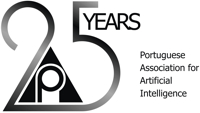Nectar Track
- A Data-Based Approach to Integrating Representations of Personality Traits, Values, Beliefs and Behavior Descriptions, by Boon-Kiat Quek, Kayo Sakamoto, and Andrew Ortony
- Comparing Different Properties Involved in Word Similarity Extraction, by Pablo Gamallo Otero
- Constraint-Based Strategy for Pairwise RNA Secondary Structure Prediction, by Olivier Perriquet and Pedro Barahona
- Cost-Sensitive Learning Vector Quantization for Credit Scoring, by Ning Chen, Armando S. Vieira, João Duarte, Bernardete Ribeiro, and João C. Neves
- Efficient Coverage of Case Space with Active Learning, by Nuno Filipe Escudeiro and Alípio Mário Jorge
- How Much Should Agents Remember? The Role of Memory Size on Convention Emergence Efficiency, by Paulo Urbano, João Balsa, Paulo Ferreira Jr., and Luis Antunes
- Roles, Positionings and Set Plays to Coordinate a RoboCup MSL Team, by Nuno Lau, Luís Seabra Lopes, Nelson Filipe, and Gustavo Corrente
- Semantic Image Search and Subset Selection for Classifier Training in Object Recognition, by Rui Pereira, Luís Seabra Lopes, and Augusto Silva
- Sensitivity Analysis of a Tax Evasion Model Applying Automated Design of Experiments, by Attila Szabó, László Gulyás, and István János Tóth
- Type parametric compilation of algebraic constraints, by Marco Correia and Pedro Barahona
- Using Operator Equalisation for Prediction of Drug Toxicity with Genetic Programming, by Leonardo Vanneschi and Sara Silva

